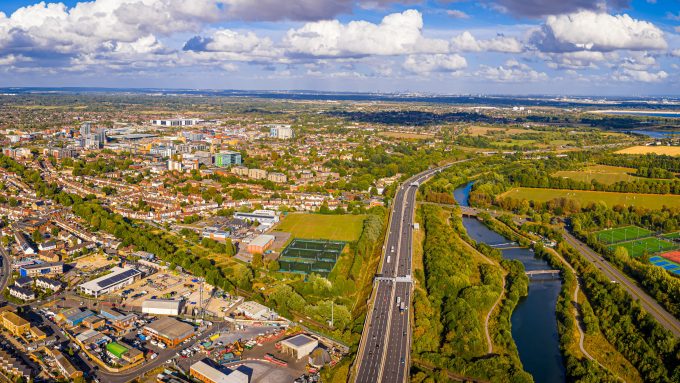
How Belfast is Using Procurement to Unlock Economic Value

Given that a substantial proportion of Belfast City Council’s public services are funded through these local taxes, it was clear that the city needed an up-to-date register of businesses.
“Over the past decade, Belfast’s economy has become increasingly dynamic, with lots of new businesses either setting up or moving premises every month. That’s obviously good news for the city. But as a result, we’ve had great difficulty in accurately tracking which businesses should be paying rates” explains Deborah Colville, Belfast City Innovation Manager and Head of the Smart Belfast programme. “We needed to improve our access to up-to-date and real-time information.”
A number of new approaches had been tried over the years to address the problem, but they tended to rely on slow and manual processes.
Smart Belfast
Under its Smart Belfast programme, the city launched a competition to encourage innovative companies to address the challenge. The selected companies each received £100,000 through the Northern Ireland Small Business Research Initiative which encourages businesses to bring innovation to public sector challenges.
Data scientists and other experts from the UK’s Connected Places Catapult came on board to better define the challenge and the specific outcomes the city wanted to achieve.
“We discovered that we needed to stop trying to second guess what a solution should look like, and instead focus on developing an excellent challenge definition process,” says Colville. “You need to commit to opening up your people and your data to give these businesses the chance to fully understand the complexity of the problem.”
After an open call, proof of concept and prototyping rounds, two companies – Analytics Engines and NQuiring Minds–were selected to tap into a range of data sources to help identify a solution to the challenge.
“We opened up 24 data sets across a whole range of other organisations, like Northern Ireland Water and Land and Property Services. We also provided our own council data sets such as waste collection, so we could find out if services had been accessed at particular premises,” she explains.
Half a million pounds identified
In the prototype phase the two companies identified an initial £500,000 of previously uncollected business rates, and since then, additional opportunities to collect revenue have been uncovered.
“The project really demonstrated the power of data science in helping the city to better understand a rapidly changing economy. Even ten years ago, cities could perhaps have relied on traditional methods to track such change. In the modern world this is no longer an option.”
“We’re now further developing the model to help us understand other aspects of the city, its economy and the ecology of its property market,” Colville says. “From there, we’re beginning to feed into wider city planning and decision-making, not just rates collection.”
Smart Belfast Framework
Challenge-based procurement is an integral component of the Smart Belfast Framework, first released in 2017, which established a permanent city innovation team driving innovative procurement approaches alongside traditional procurement, within the council.
“A key learning for us is the relationship between public innovation and public procurement. Right from the beginning we’ve been very aware that the public sector’s traditional approach to procurement can sometimes present a barrier to innovation, which by its nature can be difficult to predict in terms of success. So it’s very important that we work with our procurement experts in council to find ways to address these tensions.”
Since the launch of the Framework, the council’s City Innovation Team has delivered a diverse portfolio of 47 projects, leveraging funding worth over £10 million and working with over 200 SMEs and stakeholders. Projects have used a range of technology including IoT, AI, machine vision cameras, chatbots, VR and AR, satellite imagery and data analytics to tackle challenges in areas such as urban mobility, healthy living, air quality, tourism, economic development and the Covid pandemic.
The framework is also driving the development of a £120 million digital programme across the region as part of the Belfast Region City Deal, with investment in wireless infrastructure, healthy neighbourhoods, green energy and integrated mobility projects.
Removing barriers to innovation
Belfast is building on its learning to design ever more ambitious challenge fund programmes for wider societal challenges related to decarbonisation, mobility, citizen engagement and health. It is due to receive £55 million as part of the Belfast Region City Deal to support these funds in 2022.
Belfast’s innovation focus now is on its new Smart District and Innovation District – seeking to introduce digital innovation into the city and economy’s ongoing development and management from street level upwards. Essentially, it’s about the procurement of innovation.
“Procurement can be a very black and white way of looking at something in terms of customer and supplier relationship,” says Colville. “We’ve realised the best procurement should encourage a collaborative focus on outcomes - not solutionism. We’re working to harness the city's strengths, its creativity, research and academic excellence for the long-term benefit of all our citizens.”
Connected Places Catapult launched our Challenging Procurement programme to engage with experts and representative bodies from across the public procurement ecosystem to challenge the myths surrounding public procurement, share pioneering practice, set out new pathways and outline best practice for the procurement of new and innovative solutions by the public sector. Visit our Challenging Procurement hub to learn about the support CPC can provide and discover resources which can help you procure innovation.
Sparking the innovation potential of every place
Harnessing public procurement to signal appetite for new solutions is a common trait among successful hubs of innovation. Building on our experience supporting Belfast and its regional partners, Connected Places Catapult is growing a global network of place innovation pioneers to spark the innovation potential of every place.
Join place leaders from Belfast, Bergen, Glasgow and elsewhere at the upcoming UK Innovation Places Summit to connect with others who are using public procurement and other tools to drive new economic prosperity through innovation in their areas.





